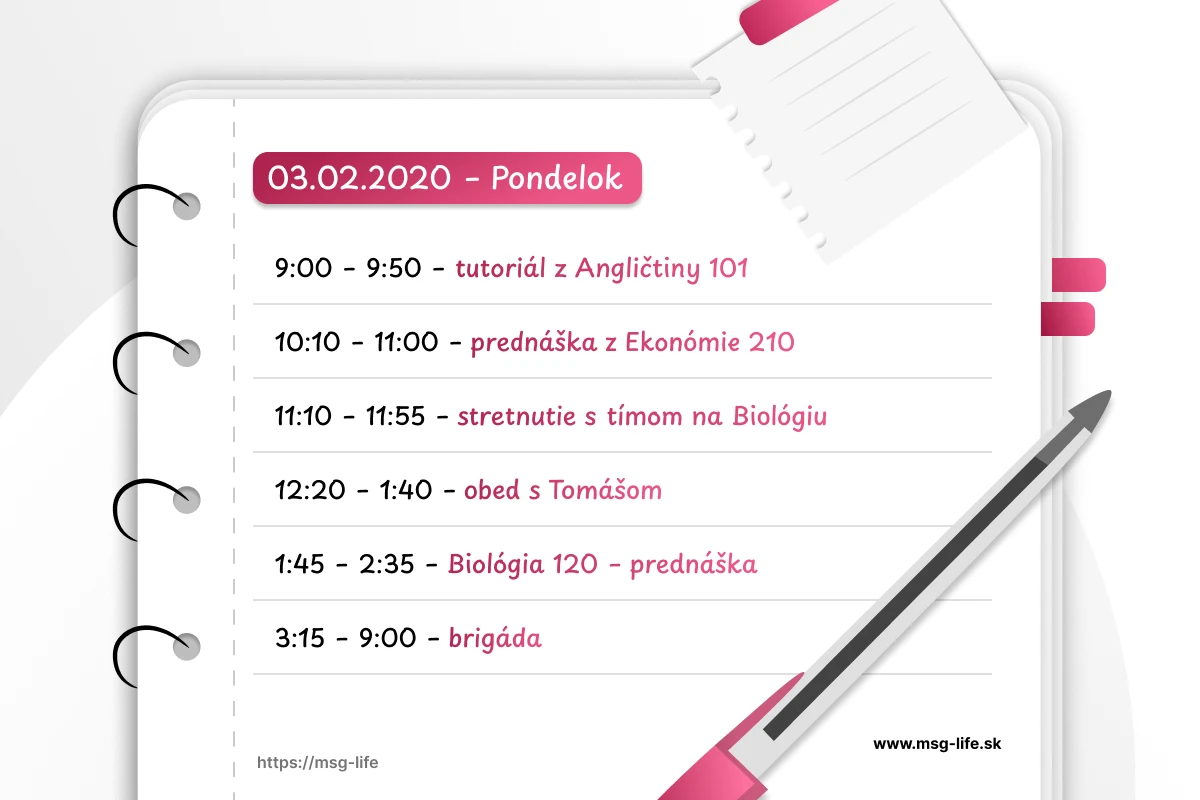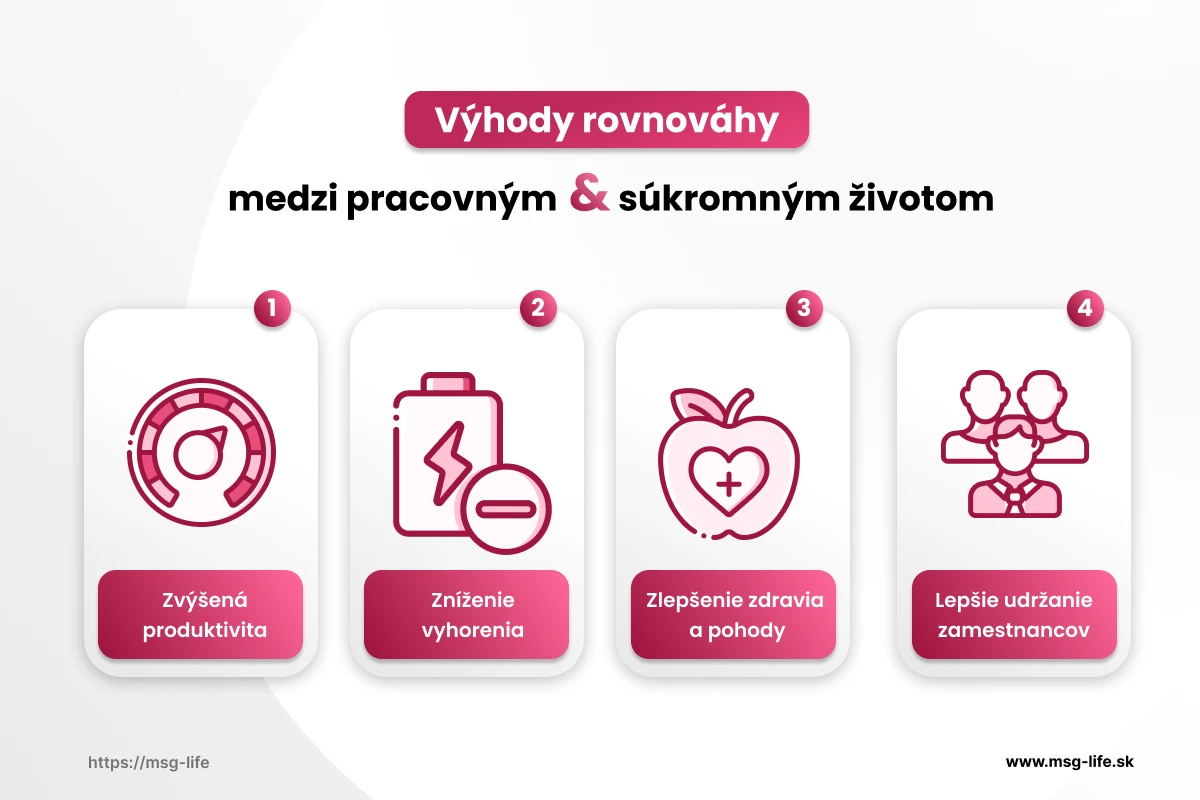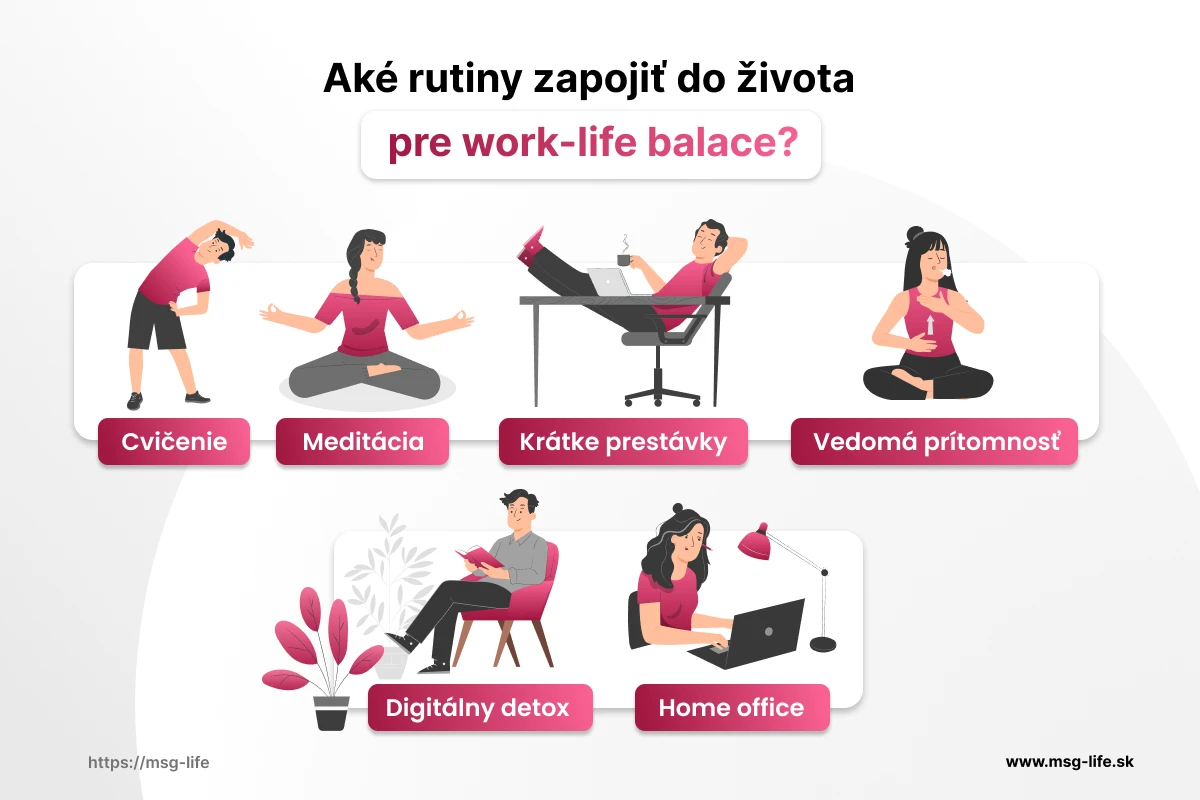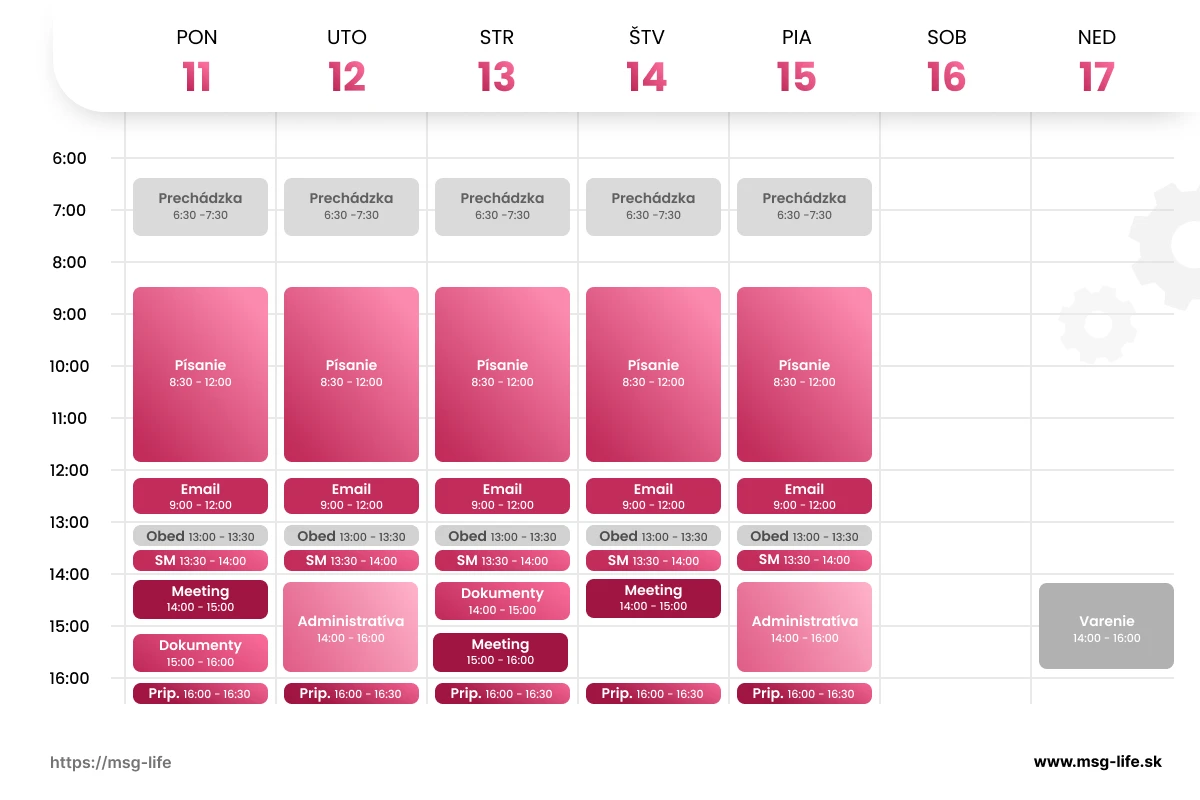Work-Life Balance: Proper Setup, Proven Tips, and How to Live in Harmony
Work-life balance is important not only for overall well-being but also for productivity and achieving both personal and professional goals. Maintaining a healthy boundary between work and leisure time is far more difficult today than it was in the past. If you feel that you lack life balance, we have prepared a few tips to help you break free from this vicious cycle.

In the article you will learn:
What is work-life balance?
The dictionary defines work-life balance as the ratio of hours spent working to the number of hours dedicated to family, friends, and leisure activities – such as exercising, reading, travelling, and the like.
While work-life balance was once a normal part of life that people rarely thought about, in today’s world it is an increasingly important topic, highlighted by many experts. With the advent of technology, hybrid work models, and home office, the lines between professional and personal life are becoming blurred. Employees are working longer hours, leaving them with less and less time for hobbies or loved ones.
It is not just technology or changes in the way we work that complicate maintaining a balanced work and personal life. Often, it is employers themselves who disrupt this balance by expecting 100% flawless performance and constant engagement from their employees. In pursuit of perfect results, many overextend themselves and spend extra hours working.
The key issue to understand is that a lack of rest and free time leads to both physical and mental exhaustion. This automatically affects work performance, which begins to decline. Employers should therefore pay attention to work-life balance and offer benefits that support it.
Why is work-life balance important?
Balance in life – both personal and professional – is crucial for programmers, testers, and all other IT specialists for several reasons:
Preventing stress and burnout
Stress is now a common part of life for most IT professionals. And it’s no wonder – heavy pressure from superiors, excessive workloads, long hours at the computer, countless tasks on the to-do list, and ignoring one’s own needs are just a few of the contributing factors.
However, everyone has their limits, and if you ignore them for too long, you risk reaching the edge of professional burnout. Burnout syndrome is a serious problem that can affect you for months or even years. It manifests through emotional and physical exhaustion, a loss of motivation, and reduced performance. It should not be taken lightly – incorporating rest into your daily routine as soon as possible is essential.

Improved mental health
A poorly set or completely missing work-life balance may initially show no adverse effects. That is why many people ignore it for months or even years. A shift usually occurs only when the first warning signs appear, such as:
- anxiety
- irritability
- depressive moods
- feeling of overwhelm
- lack of motivation and productivity
The sooner you include enjoyable leisure activities and time with loved ones in your life, the sooner you can get rid of these unpleasant feelings and start feeling better.
Stronger interpersonal relationships
If you do not have enough time, it is not only you who suffers, but also your relationships with family, friends, and close ones. Work obligations often push them into the background, which can lead to tension, arguments, or even losing certain people from your life.
However, with the right balance in place, you do not have to fear this. You gain enough time to spend with those you care about, strengthening your mutual bonds.
Higher productivity and motivation at work
If you work continuously without breaks, your productivity will inevitably decline over time. This is a natural consequence of overwork and lack of rest. To perform well, you must also know how to rest – not only in the evening before bed but also during the day, for example, through sport or another relaxing activity.

Better physical fitness and health
A chronic lack of free time causes stress, which weakens the immune system and leads to issues such as digestive problems, back pain, migraines, and other health complications. However, regular and quality rest can help you prevent these and ensure greater comfort and physical well-being.
Personal growth and self-realisation
Work is undoubtedly a significant part of life, but it is not the entirety of it. Your mind and personality need more – spiritual growth, new knowledge, skill development. These aspects are important not only for mental well-being but also for career advancement. What you learn in your free time often proves useful at work.
A sustainable lifestyle in the long run
Your lifestyle should be set up so that it is sustainable in the long term without major sacrifices or extreme changes. Constant work, however, is not sustainable. If you do not put a stop to it yourself, sooner or later your health will.
Therefore, set clear boundaries and respect your needs. This approach is not selfish and does not make you a lazy person. On the contrary – it helps you progress and achieve better results.
Proper work-life balance setup for remote workers
Maintaining work-life balance while working remotely is more challenging than it may initially seem. Employees bring work into their homes – spaces that previously served only for rest and leisure. This blurs the physical boundaries between two essential areas of life, which begin to overlap.
Home office comes with many advantages – it saves time and money and allows work in a pleasant and familiar environment. In the IT sector, which is more flexible than many others, it has become a standard. However, for those unaccustomed to it, it can significantly disrupt daily rhythms.
Work can very easily intrude into regular domestic activities or relaxation. All it takes is working longer than usual for a few days or postponing tasks until the weekend – and your daily rhythm gradually changes.

When working from home, it is important to stick to the basic principles of work-life balance outlined below. In addition, do not forget the following tips:
1. Create a dedicated workspace
Do not work from bed, the sofa, or the kitchen table. Instead, designate a small workspace where you will programme, test, and carry out other work tasks.
2. Set a fixed work schedule
When working from home, it is easy to lose track of time, and you may end up working an hour or two longer because you do not need to rush home. Therefore, set a clear schedule – when you start work and when you completely disconnect from it to focus on yourself.
3. Do not do housework during working hours
Did you suddenly remember to put on a wash, empty the dishwasher, or vacuum the flat? Leave these tasks for later, after you have shut down your computer. During work hours, focus solely on your work assignments.
4. Go outside
It is not healthy to spend entire days shut in your flat or house. Once you finish work, go for a walk, exercise, or meet with friends.
5. Use modern platforms
The rise in remote work requires the ability to coordinate schedules, communicate instructions and feedback clearly, and use tools that improve efficiency and boost productivity. This leaves more room for rest. These tools enhance communication and organisation through intuitive interfaces and dashboards. They also reduce administrative workload, allowing the team to focus more on the actual work. Do not hesitate to use them to the fullest – they can only help you.
What are the signs of a missing work-life balance?
The fact that you do not have properly set boundaries and that work is encroaching on your personal time can be indicated by several details:
- feelings of anxiety
- too much tension
- pressure
- sleep problems
- deteriorating interpersonal relationships
- exhaustion
- lack of motivation and/or productivity
- problems with concentration
If you experience one or more of these symptoms, it is quite likely that your work and personal life are not in balance – and it is time to do something about it.
Proven work-life balance practices
Whether you are troubled by feelings of anxiety, excessive stress or sleep problems, do not wait. A poorly set work-life balance and the symptoms associated with it can only worsen over time.
Unsure how to organise your schedule and priorities in a way that maintains a healthy balance between work and private life? Use these practical tips:
1. Set healthy boundaries
It does not matter whether you work from home or from an office – what is important is that your work and private life are clearly separated. Handle work tasks only during designated working hours. Do not respond to emails or messages outside of this time. Ideally, turn off notifications completely during your time off.
This way, you will establish healthy boundaries and protect yourself from burnout, anxiety and other negative effects.
2. Plan your free time
This tip is especially important for programmers, testers and other IT specialists. Fill your free time with meetings with family and friends, trips, sport, IT courses, technical workshops or other activities you enjoy. Many people tend to fill an empty schedule with additional work tasks – and that is not healthy.
Free time does not have to be precisely planned. It is enough if you think in advance about what you would like to engage in. These can also be small activities, such as reading a book, organising your wardrobe or cooking. By thinking about them, you reduce the risk of ending up back at work again.
3. Set manageable goals
Overly ambitious goals can create pressure and decrease your motivation and performance. If you have big dreams – such as learning a new programming language or building your own website – break them down into smaller steps. That way, you can work on them gradually, without burning out or taking time away from your free time.
4. Take breaks
There is no IT specialist who can concentrate for 8 to 12 hours without a break. Everyone needs to switch off from time to time, clear their mind and get a fresh perspective.
Breaks are important not only for recovery, but also to reduce the risk of burnout and improve concentration. A short switch-off from work can offer a new perspective on a problem or inspire an interesting idea.
To achieve work-life balance, it is necessary to alternate between two types of breaks:
- Short breaks during the working day – for example, for lunch, coffee or just a short rest between individual tasks.
- Longer, multi-day breaks – classic time off, during which you completely switch off and do not even think about work. How you spend this time is entirely up to you. Ideally, travel somewhere and change your environment.
5. Take care of yourself
An important aspect of finding balance between the work and personal world is devoting time to self-care. This can include steps such as:
- regular physical activity or exercise
- taking sick days, holidays or mental health days as needed
- adequate rest every night
- seeking help from friends, family or professionals
Your mental and physical health is far more important than completing a work task or ticking off every item on your to-do list. That is exactly why you should not ignore it.
6. Improve your time management
To maintain work-life balance in the working environment, especially in the IT field, thoughtful time management is essential. If you can plan your working day properly, you will not end up having to do some tasks during your free time simply because you did not finish them earlier.
However, do not overdo it with planning. Only plan as many tasks for one day as you know you can realistically handle. Start with those that need to be completed as soon as possible and then continue with the less urgent ones.

7. Learn to say no
Are you the type of person who always says “yes” to the boss or supervisor? Even when the request or task interferes with your free time? In that case, you should learn how to politely but firmly say “no”. It is fine to occasionally do something for the good of the team. However, if you do this regularly, it is not healthy and can lead to burnout.
8. Let go of excessive perfectionism
Many people have a tendency towards perfectionism in their younger years, when they dedicate all their free time mainly to school or hobbies. At this stage, it is in some ways easier to be a perfectionist, but as one grows older, builds a career and starts a family, life becomes more complicated and responsibilities increase rapidly.
Perfectionism can often do more harm than good. If it gets out of control, it can become destructive. The key to preventing overload and managing stress at work is to let go of the unhealthy desire for perfection. Instead, focus on precision in what you do, and abandon nit-picking for good.
9. Disconnect “from the network”
In the pursuit of better life balance, try to regularly switch off completely and allow yourself a digital detox. Today’s world creates in people a feeling of constant availability. The workday seems to have no end and often intrudes into personal time. All it takes is the sound of a notification, and you immediately feel the urge to check what it is. There are moments when you should simply turn off your phone and enjoy the present moment. Simple – yet for some almost impossible.
Robert Brooks, a professor of psychology at Harvard Medical School and author of a book on work-life balance The Power of Resilience: Achieving Balance, Confidence and Personal Strength in Your Life, once said something wise: “Notifications that keep coming in interrupt your supposed ‘offline mode’, where you’re only pretending not to be online.” This means these influences bring a constant stream of tension into your life. Forget about work matters and devote yourself fully to your family and hobbies. Make your seemingly free time truly quality time spent according to your own wishes.
By not responding to work notifications, you build a stronger habit of resilience. Resilient people feel a greater sense of control over their lives, while reactive ones lose that control and are more prone to stress.
10. Get moving and meditate
Even if you are busy, it is essential to find time for the most important things in life. Regular exercise is an effective way to reduce stress – it pumps endorphins into your body, making you feel much better.
Every day, set aside at least a few minutes for yourself. Great and undemanding activities that you can do almost anywhere include exercise, yoga, meditation or any other activity that fulfils you. Start with deep breathing, for example. Breathing exercises, a short 5-minute meditation or limiting alcohol and unhealthy food are key to a clear mind. It is an effective way to relieve tension through small lifestyle adjustments.
Mindfulness
If you want to achieve a balanced work and private life, a good feeling from completing a work task is not enough. This concept also includes caring for yourself – body, mind and soul. You do not need extreme effort to make a change – it is enough to open yourself to the present moment and stop thinking about what would have happened if…
To rediscover harmony between your inner and outer world, it is important to stop worrying unnecessarily about things you cannot influence. Do not have prejudices or excessive expectations. As the saying goes – if you expect nothing, you cannot be disappointed.
Instead, calm down, slow down and focus on your immediate surroundings – on smells, colours, sounds, tastes, scents, feelings and emotions they evoke in you. Live in the present and pay attention to the little things you would otherwise overlook in the rush of everyday life. That is where the beauty and peace of a content mind lie – in perceiving the present moment.
Remember – you cannot trick your nervous system
The autonomic nervous system has two branches:
- the sympathetic nervous system (the body’s stress response)
- the parasympathetic nervous system (the body’s rest and digestion response)
The key to activating the parasympathetic system includes short meditative exercises, deep breathing or “grounding” your senses. The more frequently you practise them, the more you will activate the parasympathetic system – and it will calm everything down. Not only in that moment, but gradually, permanently.
Over time, you will notice that the parasympathetic system starts to dominate in your life over the sympathetic one. This is what your balanced lifestyle might look like in practice.
11. Spend your time on people and activities that fulfil you
Have you ever thought about what is truly important in your life? Create a list of priorities and make sure they genuinely reflect your values. Set firm boundaries so that you have enough time for people and activities with high priority. Thanks to this, it will be easier for you to identify what can be crossed off the list and more quickly achieve a balanced lifestyle.
If browsing the internet pulls you into a spiral that wastes your precious time, set clear rules to separate work from free time. To boost productivity, you can try tools like Freedom, LeechBlock or RescueTime. If specific people are taking up your time, try to limit interactions with them in a diplomatic way. Focus on relationships and activities that bring joy into your life.
12. Slow and steady wins the race
Imagine you want to start running and on the first day you run 10 km. The next day, your whole body will ache and you will likely develop a negative attitude towards running. Drastic changes – such as cutting your working hours from 80 to 40 per week or daily intense training without rest – are more likely a recipe for failure. Gradual change is healthier and more sustainable in the long term.
FAQ - Questions and answers about work-life balance
How to achieve work-life balance?
Start by becoming aware of your priorities. Set clear boundaries – when you are working and when you are resting. Planning time for leisure, quality sleep, physical activity, and activities that bring you joy also helps. Avoid workaholism and learn to delegate. Balance is not a goal, but an ongoing process – and it changes depending on your stage of life.
Why is work-life balance important?
Because long-term overload leads to exhaustion, decreased performance, and health problems. Harmony between family and working life helps you maintain mental well-being, effectiveness at work, and quality relationships in your personal life. When your life is balanced, you feel more content and can handle stress and demanding tasks with greater clarity.
What are the possible consequences of a disrupted work-life balance?
A lack of balance between work and personal life can lead to chronic stress, burnout, deterioration in physical health, and strained relationships. Insomnia, anxiety, loss of motivation, and lower life satisfaction are also often present. In the long run, this affects work performance and the ability to make good decisions.
How to set boundaries when working from home?
Creating work boundaries is an important step that helps prevent burnout. Allocate specific working hours and a physical space for work. Once the working day is over, symbolically “close the office” – log off, turn off notifications, and do not work outside of agreed hours. It is important to learn to say “no” and to avoid replying to emails in the evening or at weekends.
How do I know that I need to balance work and leisure time?
If you are constantly tired, forgetful, do not have time for yourself, your family or friends, and feel stressed even outside working hours, it is a sign that the balance is not working. If you feel like work is “taking over your life”, it is time to make a change.
Which work-life balance strategies promote long-term well-being?
The most effective approaches include firm work boundaries, conscious rest, the ability to delegate, and a clear division of time between work and private life. The key is also the ability to say no and to regularly assess whether the current setup still suits you.
Does balance also help work performance?
Yes. When you have time for recovery and rest, your mind is fresher, more creative, and you are better able to cope with challenges. Balance supports healthy work habits, effective planning, and reduces the likelihood of mistakes caused by fatigue or overload.
How to talk about your work-life balance without feeling guilty?
Honestly, directly, and respectfully. If you feel that you need to adjust your workload or flexibility, say so. Many companies today understand that a satisfied employee is also a productive employee. Focus on solutions – for example, how you can manage tasks differently so that it works for both you and the team.
Is it time for a change in your life?
Work-life balance is an effective way to align your professional and personal life. In practice, it can include employee benefits, extra leave beyond the legal minimum, or flexible working hours.
Burnout prevention is key in this regard – it helps create a harmonious relationship between work and private life. Only then can a person perform at their best while also taking care of their mental and physical health.


